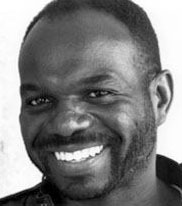Jim Crow Museum
1010 Campus Drive
Big Rapids, MI 49307
[email protected]
(231) 591-5873
It is a shame that Marlon Riggs died so young. His analysis of racism and homophobia was outstanding and groundbreaking.
-- Gibson Edwards, Las Vagas, Nevada

Marlon Riggs was known for making insightful and controversial documentary films confronting racism and homophobia that thrust him onto center stage in America's "cultural wars." Born in Ft. Worth Texas on February 3, 1957, Marlon graduated Magna Cum Laude from Harvard and received his master's degree from the University of California-Berkeley where he became a tenured professor in the Graduate School of Journalism.
Marlon's first major work, Ethnic Notions (58 min., 1987), traces the evolution of the racial stereotypes which have implanted themselves deep into the American psyche across 150 years of U.S. history. The documentary received a National Emmy Award and other top film festival honors and has become a core audio-visual "text" in a wide range of courses.
But it was Marlon's second major work, Tongues Untied (58 min., 1989), which catapulted him into the debate over public funding of the arts. This moving, highly personal, sometimes angry, always poignant documentary was the first frank discussion of the black, gay experience on television. Though acclaimed by critics and awarded Best Documentary at Berlin and other film festivals, its broadcast by the PBS series P.O.V. was immediately pounced upon by the Religious Right as a symbol of everything wrong with public funding for art and culture, particularly culture outside the mainstream. Riggs had received $5,000 from an National Endowment for the Arts' regional re-granting program (now eliminated) and P.O.V. had received both NEA and Corporation for Public Broadcasting funding.
The Christian Coalition edited a highly sensationalized seven-minute clip from the film which they sent to every member of Congress. Senator Jesse Helms was point man for the chorus of denunciation. In a telling Freudian slip, he invariable referred to the film as "Tongues United". Then Patrick Buchanan re-edited a 20-second clip from the film (a blatant copyright infringement) for a sensationalized TV ad "hit piece" blasting the NEA during the 1992 presidential primary.
Marlon responded with an Op Ed in the New York Times entitled "Meet the New Willie Horton" which recalled the notorious race-baiting ad George Bush himself used in the 1988 election. "The insult," Riggs wrote, "extends not just to blacks and gays, the majority of whom are taxpayers and would therefore seem entitled to some means of representation in publicly financed art. The insult confronts all of us who witness and are outraged by the quality of political debate."
It was perhaps inevitable that Marlon would become a lightning rod in this fight since he was an outspoken activist for a more diverse and inclusive media. In 1988 he spoke before a U.S. Senate Committee as part of the successful campaign to create the Independent Television Service (ITVS) supporting controversial, independent voices on public television. Expressing his vision of a more democratic, more inclusive television, he testified, "ITVS is supposed to shake you up, to address areas of deep taboo no one is willing to talk about, to give voice to communities which have been historically silenced. America needs to realize the value of having a communicative institution designed to challenge us and upset us. There is value in doing something more than making culture answerable to the marketplace."
Marlon's own next major work,
Marlon finally succumbed to AIDS April 5, 1994. He was 37 years old. Black Is...Black Ain't was completed by his co-producer Nicole Atkinson and editor/co-director Christiane Badgely from the footage and notes he left behind. Marlon is survived by Jack Vincent, his life companion of 15 years.
Towards the end of Black Is...Black Ain't Marlon looks up at the camera from his hospital bed and says, "As long as I have work then I'm not going to die, 'cause work is a living spirit in me -- that which wants to connect with other people and pass on something to them which they can use in their own lives and grow from." Marlon Riggs' tireless and caring spirit inspired many. We hope you too have been able to take nourishment from his last work, Black Is...Black Ain't, and will help pass on Marlon's critical eye and warm embrace.
Source: Marlon Riggs Estate